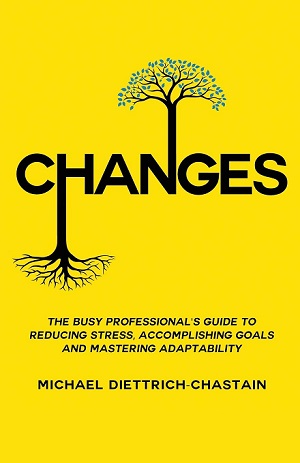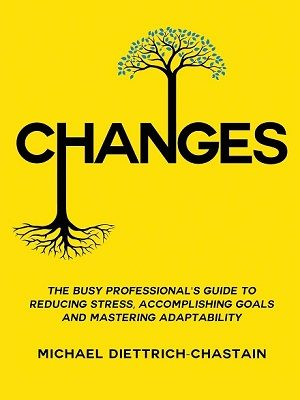CHANGES by Michael Diettrich-Chastain is a practical guide aimed at helping busy professionals navigate stress, achieve their goals, and adapt to changing circumstances. The book offers actionable strategies and tools to enhance personal and professional effectiveness through better stress management and adaptability.

Read: The Power of Discipline
1. Understanding and Managing Stress
Identifying Stress Triggers:
- Recognizing Sources of Stress: Diettrich-Chastain emphasizes the importance of identifying what specifically causes stress in your life. Understanding these triggers is the first step towards effective management.
- Personal Stress Audit: Conduct a personal stress audit to evaluate which areas of your life are most affected by stress.
Stress Reduction Techniques:
- Mindfulness and Relaxation: Incorporate mindfulness practices and relaxation techniques, such as deep breathing and meditation, to manage stress effectively.
- Physical Activity: Regular exercise is a powerful tool for reducing stress and improving overall mental health.
Building Resilience:
- Developing Coping Skills: Strengthen your ability to cope with stress by building resilience through positive thinking and problem-solving strategies.
- Support Networks: Leverage social support by connecting with friends, family, or colleagues who can provide assistance and encouragement.
2. Setting and Accomplishing Goals
Effective Goal Setting:
- SMART Goals: Use the SMART criteria—Specific, Measurable, Achievable, Relevant, and Time-bound—to set clear and attainable goals.
- Long-Term vs. Short-Term Goals: Balance long-term objectives with short-term milestones to maintain motivation and track progress.
Creating Action Plans:
- Break Down Goals: Divide larger goals into smaller, manageable tasks. This approach helps in creating a structured action plan and makes the process less overwhelming.
- Prioritization: Prioritize tasks based on their importance and urgency to ensure that you focus on what matters most.
Tracking Progress:
- Regular Reviews: Conduct regular reviews of your progress towards goals. Adjust your plans as needed based on your experiences and feedback.
- Celebrate Achievements: Recognize and celebrate small victories to stay motivated and reinforce positive behavior.
3. Mastering Adaptability
Embracing Change:
- Mindset Shift: Adopt a growth mindset that views change as an opportunity rather than a threat. Embrace change with curiosity and openness.
- Flexibility: Cultivate flexibility by being willing to adjust your plans and strategies in response to changing circumstances.
Developing Adaptability Skills:
- Continuous Learning: Stay informed and continuously update your skills to remain relevant in a constantly evolving environment.
- Problem-Solving: Enhance your problem-solving skills to effectively navigate unexpected changes and challenges.
Building an Adaptive Culture:
- Encourage Innovation: Foster an environment that supports creativity and innovation, which can make adapting to change smoother and more effective.
- Communication: Maintain open lines of communication within your team or organization to ensure everyone is aligned and prepared for change.
4. Enhancing Time Management
Effective Time Management Strategies:
- Prioritization Techniques: Use prioritization techniques such as the Eisenhower Matrix to categorize tasks based on their urgency and importance.
- Time Blocking: Implement time blocking by scheduling specific blocks of time for focused work on particular tasks or projects.
Avoiding Procrastination:
- Overcoming Procrastination: Address procrastination by breaking tasks into smaller steps and setting deadlines to create a sense of urgency.
- Accountability: Hold yourself accountable by setting regular check-ins and progress reports to stay on track.
Balancing Work and Personal Life:
- Work-Life Integration: Strive for work-life integration by creating boundaries between work and personal time. This balance is essential for reducing stress and maintaining overall well-being.
- Self-Care: Prioritize self-care practices to ensure you have the energy and motivation to meet both personal and professional responsibilities.
5. Building Effective Habits
Habit Formation:
- Establishing Positive Habits: Develop positive habits by starting with small, manageable changes and gradually incorporating them into your routine.
- Consistency: Consistent practice is key to reinforcing new habits and making them a permanent part of your life.
Breaking Bad Habits:
- Identifying Triggers: Identify triggers that lead to negative habits and develop strategies to avoid or manage these triggers.
- Replacement Strategies: Replace bad habits with positive alternatives to facilitate a smoother transition and improve overall behavior.
Monitoring and Adjusting Habits:
- Regular Evaluation: Regularly evaluate the effectiveness of your habits and make adjustments as necessary to ensure they align with your goals and values.
- Seeking Support: Seek support from mentors, coaches, or accountability partners to help reinforce positive habits and overcome challenges.
Conclusion
CHANGES by Michael Diettrich-Chastain offers valuable strategies for reducing stress, accomplishing goals, and mastering adaptability. By understanding and managing stress, setting and tracking goals, embracing change, enhancing time management, and building effective habits, you can achieve greater personal and professional success (Amazon).



